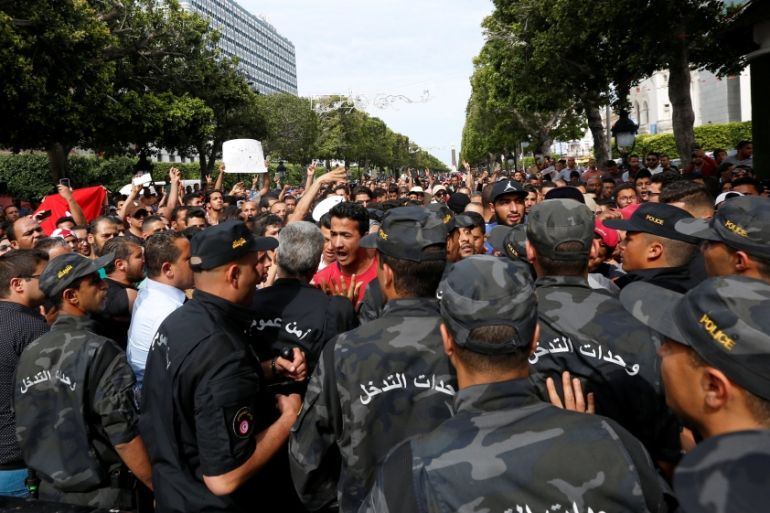Tunisian businessmen arrested in ‘war on corruption’
Those detained are accused of corruption and helping finance protest movements linked to economic frustrations.

Tunisia declared a “war on corruption” on Wednesday after the arrest of three businessmen and a customs officer suspected of graft and financing protests.
Corruption was widespread under Zine El Abidine Ben Ali, the president who was ousted in a 2011 uprising, and has remained endemic since.
Keep reading
list of 4 itemsUkraine agriculture minister released on bail in $7m corruption case
Malaysia’s ex-PM Mahathir faces anticorruption probe
Vietnam jails soft drinks tycoon for eight years in $40m fraud case
“In the war on corruption, there’s no choice. It’s either corruption or the state. Either corruption or Tunisia,” said Prime Minister Youssef Chahed.
“I want to reassure all Tunisians that the government will see this war on corruption through to the end,” he said in his first comments since the arrests started on Tuesday.
A senior official, on condition of anonymity, said that businessmen Chafik Jarraya, Yassine Chennoufi and Nejib Ben Ismail along with customs officer Ridha Ayari were arrested Tuesday “under the state of emergency” in force in Tunisia since November 2015.
“They are implicated in affairs of corruption and suspected of plotting against state security through incitement and alleged financing of the protest movements in Tataouine and other regions,” he said.
The death of Anouar Sakrafi
The arrests follow the death of Anouar Sakrafi, who succumbed to his injuries on Monday after a police vehicle ran over him during protests.
Violence gripped the rally as protesters clashed with security forces in the southern region of Tataouine, the scene of long-running protests over joblessness.
![Mourners gather in front of the house of a Anouar Sakrafi, who died after being run over by a police vehicle during protests over jobs, in Tatouine, Tunisia [Zoubeir Souissi/Reuters]](/wp-content/uploads/2017/05/5bdda00729ba449f8583a67860c9dc77_18.jpeg)
Security forces fired tear gas as demonstrators tried to storm the el-Kamour oil and gas plant, radio reports said.
Dozens of people were hurt in the clashes, including about 20 security personnel.
The government has said Sakrafi’s killing was accidental.
Protesters have been camped outside the el-Kamour pumping plant for about a month, blocking trucks from entering.
Clashes also erupted on Monday in Tataouine, when protesters briefly forced the closure of the Vana pumping station.
Police fired tear gas to disperse the hundreds of protesters demanding jobs and a share in revenue from gas and oil companies.
‘Long list of corruption barons’
On Wednesday, Tataouine’s new governor Mohamed Ali Barhoumi resigned, saying in a post on Facebook that it was “for strictly personal reasons”.
He was named governor just weeks ago after two senior officials were dismissed following a visit by the prime minister to the troubled region.
READ MORE: Thousands protest Tunisia’s corruption amnesty bill
The unrest represents a challenge to the authority of Chahed’s government as it tries to enact economic reforms demanded by international lenders and consolidate Tunisia’s transition to democracy.
![Protesters, who are demanding jobs and a share in revenue from the area's natural resources, block the roadusually used by foreign oil companies [Zoubeir Souissi/Reuters]](/wp-content/uploads/2017/05/85fb6f7c78274001b9f9efa687b531c3_18.jpeg)
Chahed has vowed to fight corruption since taking office last year, when the head of the national anti-graft body, Chawki Tabib, warned the problem had reached “epidemic” proportions.
The latest arrests come after Ben Ali’s nephew, Imed Trabelsi, apologised to the Tunisian people on national television last week for corruption during his uncle’s leadership.
Trabelsi recounted how he grew rich thanks to a well-oiled system involving the complicity of customs officers, high officials and ministers.
Praise over arrests
Tunisians on social media and in the press applauded Tuesday’s arrests, calling for the launch of an anti-graft probe such as Italy’s “Clean Hands” campaign in the 1990s.
But others said they hoped the arrests were not a “smokescreen” at a time when the authorities faced mounting social unrest.
Youssef Belgacem, from anti-corruption non-governmental organisation I-Watch, tentatively welcomed the “surprising” arrests.
“We hope it’s a serious first step in the war against corruption and the corrupt, and not an attempt to appease protests in Tataouine and elsewhere,” he said.
“The list of corruption barons is still long.”
لو اتّضح انه تحوّل حقيقي في سياسته، لن يجد الشاهد سوى الدعم من الشعب التونسي.
— Jaouhar Ben Mbarek (@jaouhar) May 24, 2017
Political activist Jaouhar Ben Mbarek wrote on Twitter: “If this is a real change of policy, then Chahed will find nothing but support from the Tunisian people.”
Tunisia was ranked 75th out of more than 170 countries in the 2016 corruption perceptions index published by Transparency International. It had been 59th in 2010.